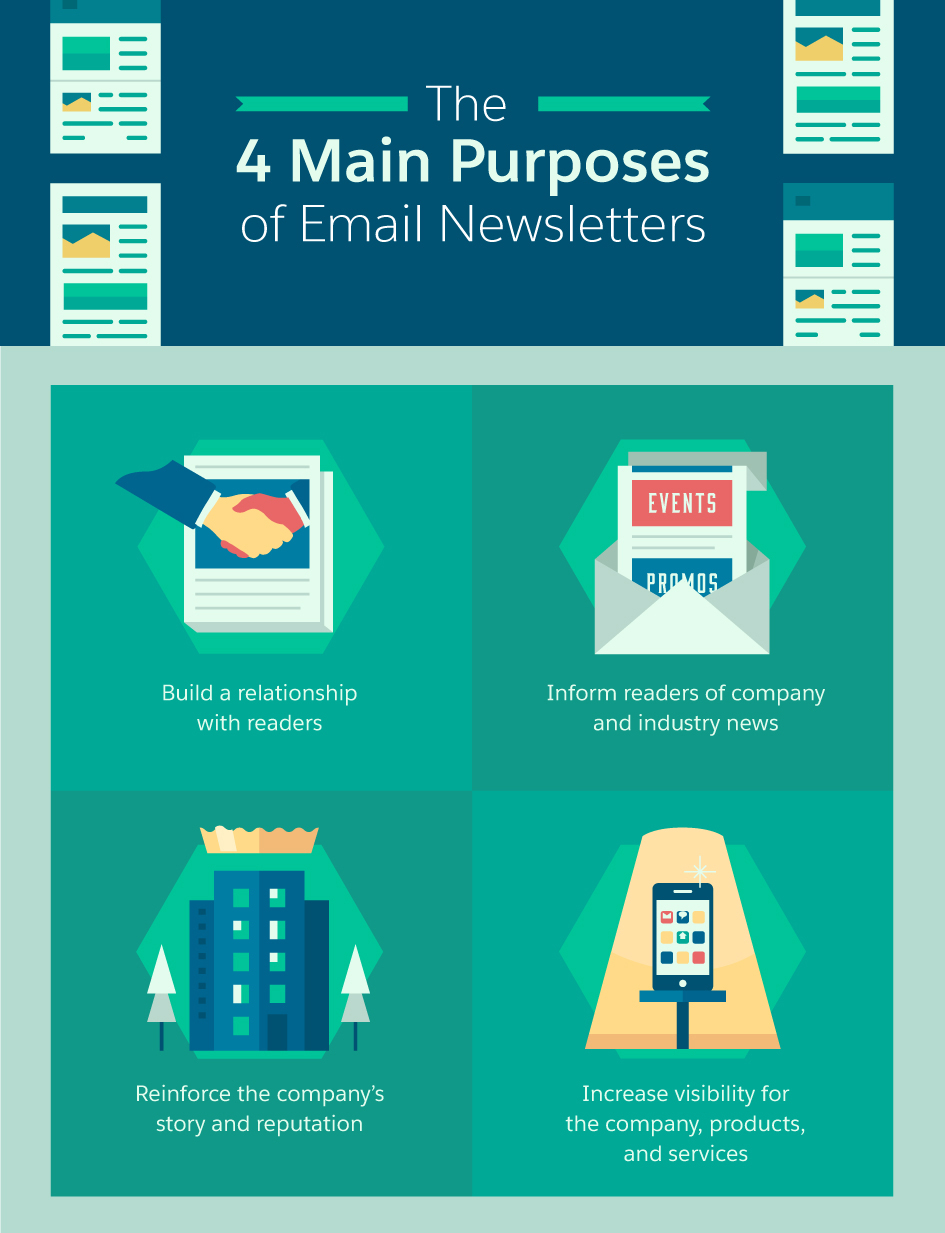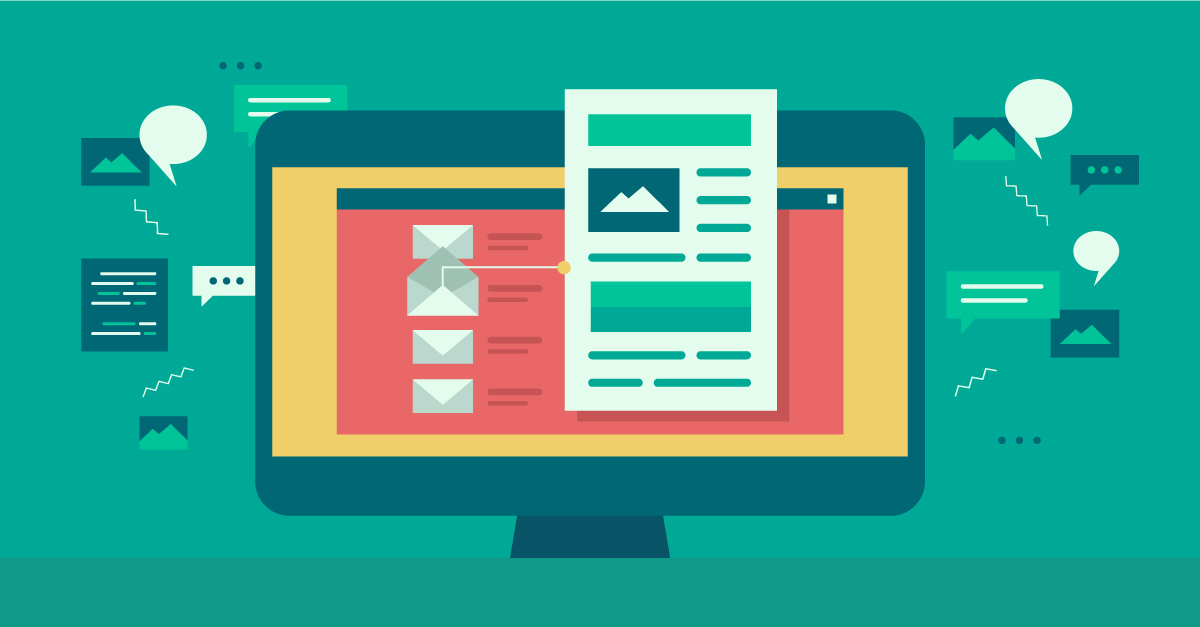If you’ve been around for more than two decades, chances are you remember a time when you were excited to check your email. In the early days of the internet, emails popped into your inbox at a slow, steady pace.
These days, that steady trickle has turned into an avalanche. Sure, you still get useful updates from your friends and favourite companies, but those are buried beneath mounds of work emails and dozens of newsletters that you forgot you signed up for. If it seems like the age of email newsletters has passed, hold off on hiring the hearse: Email newsletters are still very much alive. Though perhaps not quite as spry as they were a decade ago, they are still a worthy marketing tactic for any company that wants to communicate directly with their fans.
A great newsletter can slice right through today’s packed and noisy inbox to inform, entertain, and excite your readers, which can give your bottom line a nice bounce. Perhaps Rebecca Greenfield of Fast Company says it best: “In a post-email world, where our inboxes have turned into cesspools of responsibility, the internet newsletter—against all odds—has made a comeback.”
Why Email Newsletters Might Still Be the Best Marketing Tactic Ever
Email newsletters aren’t the flashy marketing flavour of the month like the newest social media platforms can be. However, numbers don’t lie, and the numbers say that email newsletters not only work—they might actually work better than anything else your marketing department currently does. An article from McKinsey & Company found that “email remains a significantly more effective way to acquire customers than social media—nearly 40 times that of Facebook and Twitter combined.”
The 4 Main Purposes of Email Newsletters
- Build a relationship with readers
- Inform readers of company and industry news
- Reinforce the company’s story and reputation
- Increase visibility for the company, products, and services

Why is email still so powerful? Dean Levitt, Chief of Culture at Mad Mimi Email Marketing, cites a Pew Research Center study that found “9 in 10 adults go online to check email, more often than they shop online or visit social media sites.” Given these numbers, it shouldn’t be surprising that,according to a survey by research firm Nielsen Norman Group, people prefer to receive company updates via email rather than social media by a nine-to-one margin!
Consumers aren’t just voting for email with their answers to surveys; they’re also voting with their dollars. Dean Levitt points to a study by Experian that found that “$1 spent on email marketing typically provides a return of $45 to $50.”
Email Newsletters vs. Email Marketing
Marketers need to be aware that there is a big difference between the look, feel, and purpose of a newsletter versus an email marketing campaign. Things like automatic follow-up emails based on a consumer’s behaviour or a carefully crafted drip email campaign meant to walk a prospect through a sales funnel are not in the realm of newsletters. That isn’t to say that newsletters shouldn’t include calls to action—many of them do—or try to sell products or services. Rather, the main purpose of a newsletter is typically to:
- Build a relationship with readers
- Inform readers of company and industry news
- Reinforce the company’s story and reputation
- Increase visibility for the company, products, and services
How to Create the World’s Greatest Email Newsletter
Is it time to revive your company’s email newsletter? You may find that it is more challenging than ever to snag precious opens and clicks. Your readers have an inbox filled to the brim with other newsletters, and not nearly enough time or interest to read them all. That means that your newsletter not only has to be better than all those others—it has to be way better. These tips can help you craft an email newsletter masterpiece that readers won’t be able to ignore.
Write an Interesting Subject Line and Snippet
Your email subject line is the first thing readers see and the primary factor they consider when deciding whether or not to open your message. If your subject line is bland, confusing, or irrelevant, then it will be the first and only thing your readers see as they scroll on past.
There is no perfect formula for writing a subject line. Instead, your goal is to intrigue your reader enough that he or she will open the email. That might mean writing a tantalizing teaser, something funny, or highlighting a problem that a reader desperately wants to solve. Keep it short and simple, and don’t forget the snippet: Most people who check their inbox see the subject line and a snippet of the email. Use this snippet to add more context to the subject line or to start explaining what readers can expect by opening your newsletter. Test different types of subject lines to figure out which ones resonate the best with your readers.
Write Great Content
If you want your email newsletter to excite your readers, you have to write crisp, active content that readers will love. The content you write will depend on the purpose, function, and primary audience of your newsletter. If you are a non-profit association, for example, you may want to include a powerful case study that spotlights the different efforts of your organization. If you are a company like BuzzFeed, then your newsletter should be full of irresistible headlines that readers won’t be able to resist clicking through to your main site.
Figure out what you want your newsletter to achieve and then write clear, concise, and compelling content to make that happen. Your newsletter content should be just as high quality as your best blog posts.
Pro Tip: Avoid over-writing. Newsletter readers skim, so less is more.
Extra Pro Tip: Identify one primary action item and then make sure that action item is the biggest, easiest, and most supported call to action.
Questions Your Newsletter Content Should Be Able to Answer
- Why did they come to your website in the first place?
- Satisfy their quest for information or knowledge
- What is their biggest problem?
- Every niche has its major problems to be solved
- Hone in on a problem your reader is trying to solve, and then provide a way to solve it
- What are they afraid of?
- If you can identify their fears and then provide a way to deal with them, you’ll gain instant emotional and cognitive appeal
- What would make them more money or reach their goals?
- Give readers information that could help them achieve higher sales or another goal
- What are the industry buzzwords?
- People often join your mailing list simply because it sounds good
- Whatever your industry buzzwords are, use them to gain appeal with your audience

Excellent Design and Graphics
A newsletter is a professional piece of marketing, and it should look like it. If you don’t have a graphic designer to help, you are in luck: Most email service providers, like Salesforce’s Marketing Cloud, provide professional templates that allow even the most committed Luddite to easily design a sleek, personalized newsletter. When designing your newsletter, focus on including plenty of white space and high-quality images. That may mean investing in stock art, but the beautiful result will be well worth the cost.
Pro Tip: Google Images is not your image treasure trove! If you use an image you found on Google into your newsletter without permission, it’s likely you could be in copyright infringement territory.
Create Value
Give your readers a compelling reason to open your email by spoiling them: Treat readers like VIPs. BirchBox has mastered this technique. Each of its beautiful email newsletters contains information on its latest and greatest beauty products, along with exclusive offers and insider sneak peeks. Use your email newsletters similarly to how BirchBox does to make recipients feel truly pampered.
Make it Mobile Friendly
You know how most members of the youngest generation are glued to their phones? Well, so is everyone else, and it’s time to embrace the mobile reality for your newsletter. Make sure your email looks just as good on a small screen as it does on your larger computer monitor. Before you hit send on your next newsletter, shoot yourself a test email and open it on your phone. Check to see if content feels too long, if any links have trouble loading, and how the graphics display on your phone.
Segment and Test
Though it will take extra time and effort, sending more personalized newsletters to specific segments of your email list will increase the likelihood that your newsletter will resonate with the individuals on that list. This will, in turn, result in more opens and more clicks. For example, McKinsey & Company spotlights one company, Gilt Group, which sends 3,000 variations of its daily e-mail based on a user’s past browsing habits on its websites.
Of course, you don’t need to start writing an individual newsletter for each person on your email list. But let’s say that your nonprofit organization has two primary goals: to build schools in impoverished communities and to increase access to clean water in those same communities. Sure, you could send a single newsletter to your entire email list giving updates on each endeavour. Or, you could ask people which cause they care about more when they sign up for your newsletter, and then send a tailored email to each list that offers more information on either your school building projects or your water projects.
Testing your newsletters is another task that requires more effort but can pay off big. Only pick one factor to test at a time—otherwise you won’t know which factor is affecting your results—and then test two or three different versions of it. Kissmetrics suggests testing:
- Calls to action
- Subject lines
- Message layouts
- Personalization
- Body text
- Headlines
- Closing text
- Images
- Offers
Many email support providers have built-in A/B testing capabilities. Take advantage of it! Just a five per cent increase in open rates on a 25,000-person list means 1,250 more people reading your email!
Use Your Marketing Platform to A/B Test Components of Your Email Newsletter
- Calls to action
- Subject lines
- Message layouts
- Personalization
- Body text
- Headlines
- Closing text
- Images
- Offers

It’s ALIVE!
Grabbing a person’s attention with your email newsletter is harder today than it was 10 years ago, but it is still worth the effort. Despite the rise of social media, email still offers that one-on-one connection with someone who has shown interest in your company. Take the time to build a strong email list to save you many marketing dollars in the face of rising “play-for-play” social media channels.
Of course, if you’re going to send out a newsletter, it’s worth doing right. Sure, you can peck out a mediocre email newsletter in an hour, but no one but your mother will read it (and even she might skim). Take the time and do it right! Make sure you define the goals of your newsletter, offer readers an intriguing subject and teaser, and follow up with great writing and professional graphics. Treat your readers like VIPs with special offers and sneak peeks. Even if your open and click-through rates are good, push yourself to improve with testing and segmentation. Before you know it, your emails will be so good that readers will open them á la Pavlov’s dog (minus the drooling).
Share "Why Email Newsletters Are Still Worth Your Time" On Your Site




